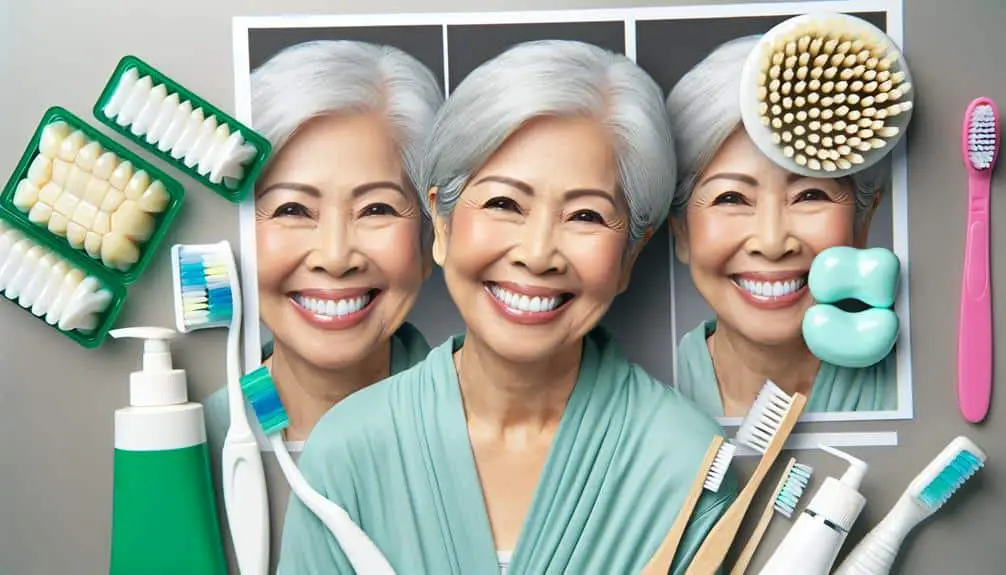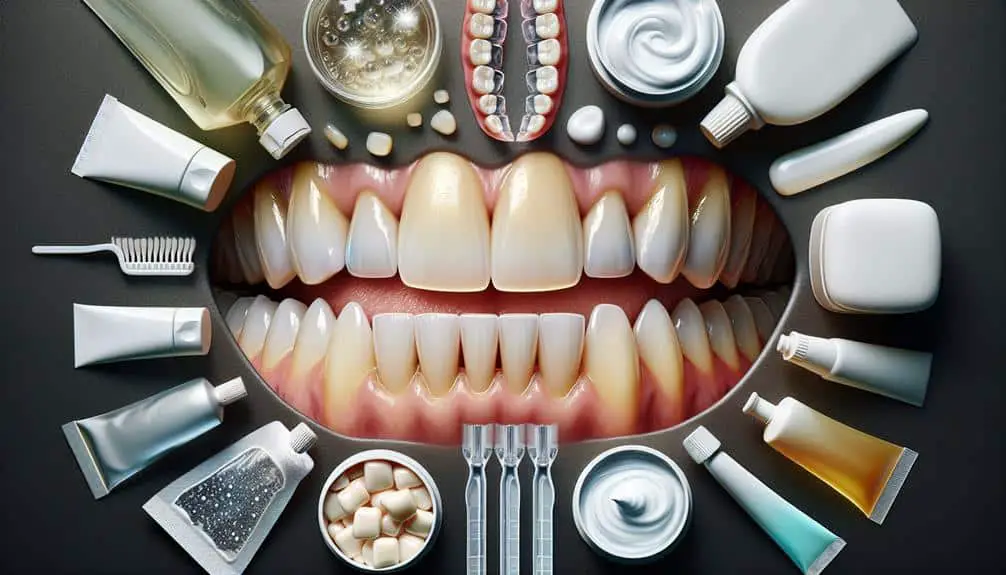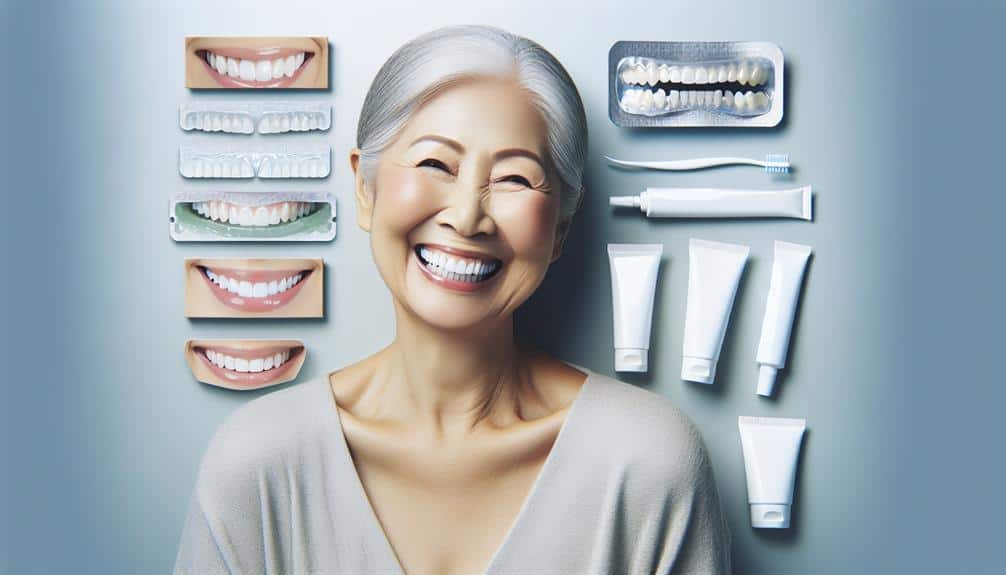To keep your aging teeth white for longer, focus on the causes of discoloration like aging, genetics, and dietary habits. Try using proven methods such as baking soda with hydrogen peroxide for surface stains and oil pulling with coconut oil to reduce bacteria. Combining home remedies with professional treatments can give you best results.
Remember that aging teeth are more prone to staining due to thinner enamel, so regular dental check-ups and good oral hygiene are essential. Seeking professional whitening options can provide potent and longer-lasting outcomes. Understanding these factors and maintaining consistent oral care practices will help you achieve lasting whitening results on your aging teeth.
Key Points
- Professional treatments offer potent and lasting whitening results.
- In-office procedures provide immediate changes in tooth color.
- Custom take-home whitening kits offer gradual whitening.
- Higher whitening agent concentrations target stubborn stains effectively.
- Dental professionals and quality agents ensure longer-lasting outcomes.
Factors Affecting Whitening of Aging Teeth
When considering factors affecting the whitening of aging teeth, it's important to understand the impact of intrinsic and extrinsic discoloration. Intrinsic discoloration occurs within the tooth, often due to aging, genetics, or certain medications. Extrinsic discoloration, on the other hand, affects the outer layer of the tooth and is commonly caused by dietary habits and lifestyle choices.
Your dietary habits play a significant role in the discoloration of your teeth. Foods and beverages such as coffee, tea, red wine, and dark berries can stain your teeth over time. Additionally, acidic foods and drinks can erode the enamel, making your teeth more susceptible to discoloration. Being mindful of your consumption of these items can help maintain the whiteness of your teeth.
Moreover, lifestyle choices like smoking can heavily impact the color of your teeth. Nicotine and tar from cigarettes can cause stubborn stains that are challenging to remove. By making healthier lifestyle choices and being conscious of your dietary habits, you can positively influence the whiteness of your aging teeth.
Best Practices for Whitening Aging Teeth
To effectively whiten aging teeth, it's crucial to implement proven methods that target discoloration while prioritizing dental health. When considering whitening options, home remedies and natural solutions can be effective for achieving lasting results. One popular home remedy is baking soda mixed with hydrogen peroxide, which can help remove surface stains on teeth. Additionally, oil pulling with coconut oil is a natural solution that may reduce bacteria and improve overall oral health.
When using home remedies or natural solutions, it's important to proceed with care and consult with a dentist to make sure they're safe and suitable for your teeth. While these methods can be beneficial for some individuals, they may not provide the same level of whitening as professional treatments. It's advisable to combine home remedies with regular dental cleanings and professional whitening treatments for the best results. By incorporating these practices into your oral care routine, you can effectively whiten aging teeth while maintaining good dental health.
Understanding the Effects of Aging on Teeth Whitening
Understanding how aging impacts the effectiveness of teeth whitening treatments is essential for achieving peak results and maintaining dental health. As teeth age, the enamel naturally wears down, becoming thinner and more translucent. This can lead to the yellowish dentin underneath showing through, making the teeth appear more discolored. Additionally, aging teeth are more prone to staining from everyday habits like drinking coffee, tea, or red wine, and smoking.
To prevent discoloration in aging teeth, it's important to take into account the type of whitening treatment used. While over-the-counter whitening products can be effective, professional treatments from a dentist can provide more significant and longer-lasting results. Dentists can tailor treatments to accommodate the specific needs of aging teeth, ensuring safer and more effective whitening.
Incorporating good oral hygiene practices and regular dental check-ups into your aging teeth maintenance routine is also essential. Brushing and flossing daily, using whitening toothpaste, and avoiding foods and habits that contribute to staining can help maintain a brighter smile as you age. By understanding the effects of aging on teeth whitening and taking proactive steps, you can achieve lasting results and keep your smile looking vibrant.
Maintaining Whitening Results in Aging Teeth
As you aim to preserve the whitening results achieved for aging teeth, implementing consistent oral care practices is essential for sustaining the vibrancy of your smile. Prevention techniques play an important role in maintaining the effects of teeth whitening over time. Regular brushing with a whitening toothpaste, flossing to remove plaque buildup, and using mouthwash can help prevent new stains from forming. Long-term strategies such as visiting your dentist for routine cleanings and check-ups can aid in monitoring the whiteness of your teeth and addressing any concerns promptly.
In addition to professional care, lifestyle changes can contribute significantly to the longevity of your whitening results. Avoiding foods and beverages known to stain teeth, such as coffee, tea, and red wine, can help preserve your bright smile. Home remedies like oil pulling or using baking soda as a gentle abrasive can also assist in maintaining the whiteness of your teeth between professional treatments. By incorporating these practices into your daily routine, you can extend the lifespan of your teeth whitening results and enjoy a radiant smile for years to come.
Professional Options for Whitening Aging Teeth
Exploring professional whitening options can provide effective solutions for rejuvenating the brightness of aging teeth. When over-the-counter options aren't delivering the desired outcome, professional treatments can offer more potent and lasting results. In-office whitening procedures, such as laser or light-activated treatments, are popular choices for those seeking immediate and noticeable changes in the color of their teeth. These methods often involve higher concentrations of whitening agents that can penetrate deeper into the enamel, targeting stubborn stains that accumulate over time.
Dentists also offer custom-made take-home whitening kits, which provide a more controlled and gradual whitening process compared to over-the-counter products. These kits typically include custom-fitted trays and professional-grade whitening gel, allowing for a more tailored approach to address specific concerns. While professional options may come at a higher price point, the expertise of dental professionals and the use of high-quality whitening agents can lead to superior and longer-lasting results compared to at home alternatives or natural remedies.
Frequently Asked Questions
Can Aging Teeth Be Whitened as Effectively as Younger Teeth?
Yes, aging teeth can be whitened effectively with modern treatments. The effectiveness of whitening may vary based on individual factors like enamel health. Consistent care and professional guidance can help maintain lasting results for whitening aging teeth.
Are There Any Specific Dietary or Lifestyle Factors That Can Impact the Whitening of Aging Teeth?
To achieve lasting whitening results for aging teeth, consider the impact of dietary choices and lifestyle factors. Certain foods and habits, like consuming acidic foods and smoking, can stain teeth. Maintaining a balanced diet and good oral hygiene can help preserve whiteness.
How Long Do the Whitening Results Typically Last for Aging Teeth?
To preserve whitening effectiveness for aging teeth, it is crucial to follow a proper dental hygiene routine. The duration of whitening results varies, usually lasting 6 months to 2 years. Regular touch-ups and avoiding stain-causing habits can help extend the effects.
Are There Any Natural Remedies or DIY Methods That Can Help Maintain Whitening Results for Aging Teeth?
To maintain whitening results for aging teeth, explore natural remedies and DIY methods. Consistent care and smart choices can help prolong the effects. Embrace gentle techniques and products for lasting brilliance and overall dental health.
Can Professional Whitening Treatments Have Any Negative Effects on Aging Teeth, Such as Increased Sensitivity?
Yes, professional whitening treatments can cause increased sensitivity in aging teeth. This temporary side effect is common but can be managed with desensitizing toothpaste or gels recommended by your dentist. Prioritize long-term whitening benefits over short-term discomfort.
Conclusion
Congratulations on starting the journey to achieve lasting whitening results for your aging teeth! Remember, consistency is key when it comes to maintaining that youthful sparkle.
So keep brushing, flossing, and using whitening products regularly. And if all else fails, there's always the option of seeking professional help.
Just remember, aging gracefully doesn't mean your teeth can't shine bright like a diamond!



